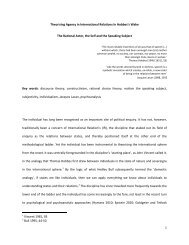biological sciences HONOURs 2014 - The University of Sydney
biological sciences HONOURs 2014 - The University of Sydney
biological sciences HONOURs 2014 - The University of Sydney
Create successful ePaper yourself
Turn your PDF publications into a flip-book with our unique Google optimized e-Paper software.
50 CARNIVORE ECOLOGY,<br />
EVOLUTION AND<br />
BEHAVIOUR<br />
Research Interests<br />
Carnivores can have large effects on the structure and function<br />
<strong>of</strong> food webs and ecological communities. Yet, the mechanisms<br />
through which carnivores have these effects are <strong>of</strong>ten poorly<br />
understood. My research uses an integrative approach to<br />
understand how the physiology <strong>of</strong> carnivores influences their<br />
behavioural choices and, ultimately, determines their role in<br />
food webs. I am especially interested in how nutrition can<br />
be used as a unifying framework to scale from molecules to<br />
food webs. Recent work in my group has shown that lipid is<br />
an important nutrient for carnivores, that lipid content varies<br />
widely among prey, and that regulation <strong>of</strong> dietary lipid by<br />
carnivores could be an important factor regulating food chain<br />
length in arthropod communities.<br />
More about my research interests can be found at my website:<br />
sites.google.com/site/shawnmwilder<br />
Honours projects<br />
1. Why don’t spiders eat caterpillars more <strong>of</strong>ten? Caterpillars<br />
are ecologically abundant prey. Yet, they account for less than<br />
5 % <strong>of</strong> the prey fed upon by spiders in the field. This project<br />
will test several hypotheses for why spiders seem to rarely feed<br />
on caterpillars in nature. <strong>The</strong>re is also the potential to examine<br />
Dr Shawn Wilder<br />
Room 323, Heydon-<br />
Laurence Building A08<br />
T: (02) 9036 6262<br />
E: shawn.wilder@sydney.<br />
edu.au<br />
how spider avoidance <strong>of</strong> caterpillars affects levels <strong>of</strong> herbivory on plants either in a natural<br />
setting or for agricultural crops.<br />
2. What are the nutritional requirements <strong>of</strong> carnivores for growth and reproduction?<br />
Much less is known about the nutritional requirements <strong>of</strong> carnivores relative to herbivores and<br />
omnivores. Projects are available to examine the nutritional requirements <strong>of</strong> a range <strong>of</strong> different<br />
carnivores and how these carnivores meet these requirements in nature. Studies can also be<br />
done to compare the nutritional requirements <strong>of</strong> carnivores and herbivores.<br />
3. How do marsupial carnivores regulate their diet? Several marsupial carnivores are<br />
maintained in captivity for education and captive breeding programs. Projects are available to<br />
examine the nutrient regulation <strong>of</strong> captive marsupial carnivores to test if they balance their diet<br />
among macronutrients and to compare their dietary preferences with standard diets in captivity.<br />
Projects can be done on several marsupial carnivores including dunnarts, quolls, or Tasmanian<br />
devils, in collaboration with the Medical School, Secret Creek Sanctuary, or the Taronga Zoo.
















